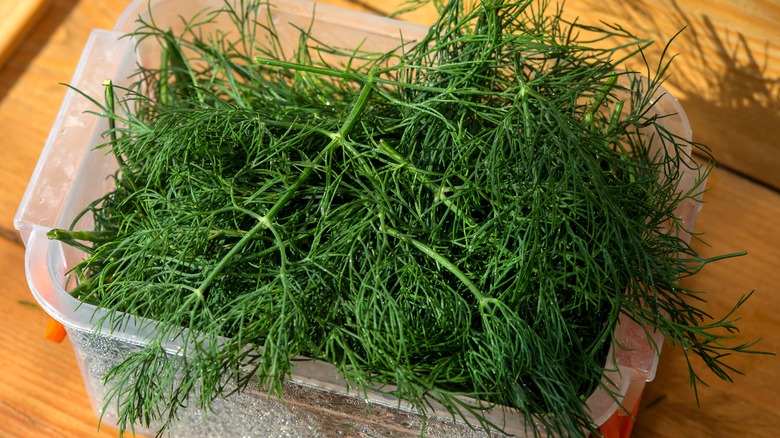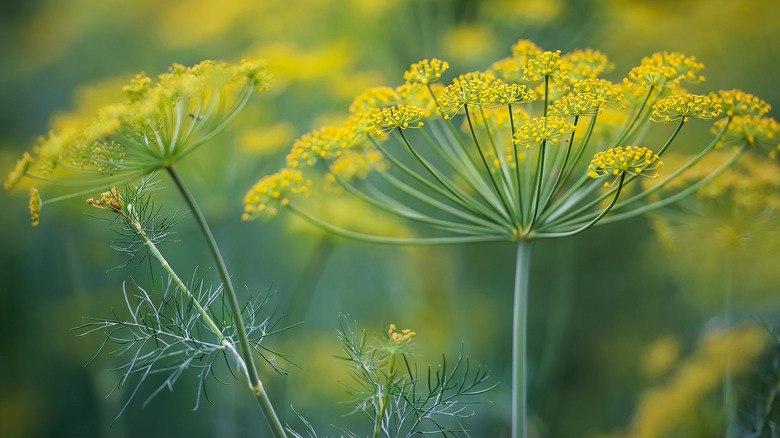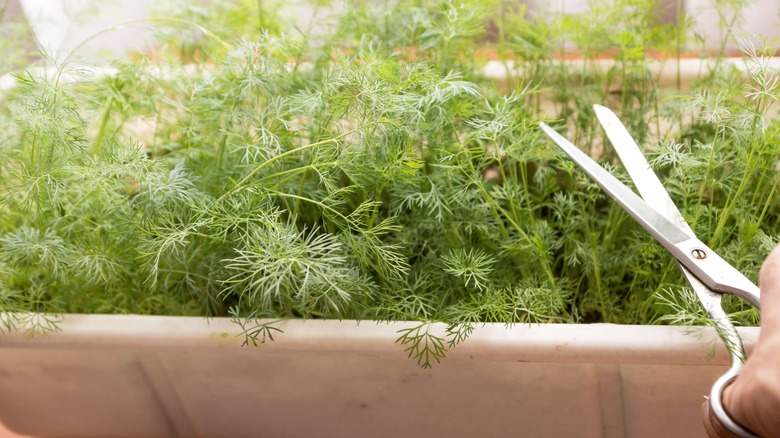The Absolute Best Ways To Keep Dill Fresh
If you've ever noshed on a flooring potato salad, popped open a jar of pickles, or devoured the tray of deviled eggs at your neighbor's dinner party, you already know all about dill. Or, rather, you already know how transformative it is to any dish. But what makes dill unique? And why grow it, use it, and preserve it?
Dill (Anethum graveolens) is an herb from the celery family with thin, fennel-like leaves and small, oval-shaped seeds. Healthline reports that dill is a rich source of essential vitamins and minerals, including vitamin C, manganese, and vitamin A. People also turn to dill for remedying digestion problems, liver disorders, and for protection against infections, per WebMD. With all of these health benefits, it's convenient that dill happens to be a delicious character in the kitchen. It's often paired with salmon and potatoes, which are both easy to cook — and excellent sources of Omega 3 fatty acids and minerals. Since dill can be a daily rider in the healthy modern kitchen, here are some tips for keeping it fresher longer.
Refrigerate fresh dill
Nothing is as tried-and-true for keeping produce fresh as the fridge. To get the maximum fridge life out of fresh dill, United Regulations recommends rinsing your dill leaves under cool water and patting them dry with a paper towel. If you're harvesting your dill straight from the garden, make sure to carefully dry any dew from the leaves as well. Then, wrap the dill in the damp paper towel and roll it up, burrito-style. Place your dill burrito in an airtight container or sealed plastic bag in the fridge. We recommend the crisper drawer to minimize oxygen exposure.
According to the culinary experts at OrthodoxUnion.org, those cute and trendy produce bags with small holes for air circulation are useful if your newly-harvested dill is still dripping wet and moisture needs to escape, but a bag with an airtight seal is much more effective for preservation. This method, they report, will keep your dill fresh for up to 1 week.
Dry and store dill weed
Herbs like sage, rosemary, oregano, dill, and thyme are ideal for drying, since they naturally don't retain a lot of moisture. "Because their flavors become more concentrated during the drying process," they explain, "you can use smaller amounts of them. That saves money if you're buying them." The drying process is a shockingly effective way to extend the natural life of your fresh herbs, as well. One tablespoon of fresh leaves is the equivalent of approximately one teaspoon of dried leaves, so you can use 2-3 times less, making it more bang for your buck.
Dill is a monocarpic plant, meaning it flowers and produces seed only once, and then dies. Gardeners.com recommends harvesting your herbs before they have flowered; younger herbs retain all the flavorful essential oils that can be released after flowering.
In order to properly dry herbs, Mother Earth News suggests starting by pruning any yellow or discolored leaves from the dill. Then, gather the stems into a bundle and tie them tightly with twine or a rubber band. Hang the bundle in a dark, dry place, like from a doorknob or closet hanger. Your dried dill should be ready to use in a few weeks, once the leaves easily crumble in your fingers. The dried dill can then be stored in airtight jars with the shelf-life of any other dried herb in your pantry.
Ice cube tray
The freezer is like a time-machine for food preservation, with perhaps one exception: produce. It's a ballet dance to keep fruits and veggies from becoming wilted and freezer-burnt; what about a delicate herb like dill?
MasterClass Chef Alice Waters offers a method using an unlikely kitchen tool: the ice tray. She advises cooks to wash, dry, and chop the fresh dill, then portion it into the ice cube trays. Fill the trays with just enough water to cover the dill and allow it to freeze completely. To extend their freezer life even longer, Waters suggests transferring the ice cubes to a plastic freezer bag. This way, she says, the frozen dill will stay fresh for up to four months.
The folks at HuffPost propose a slight variation on Waters' method. Instead of filling the ice cube trays with water, they suggest freezing the dill in olive oil. The natural preservatives within the oil protect the herb from premature browning and provide an added layer of protection from freezer burn. So, whenever you're ready to spice up your salmon or knock out your own dinner party guests with a tray of killer deviled eggs, you can be sure that your dill will be fresh and waiting.



